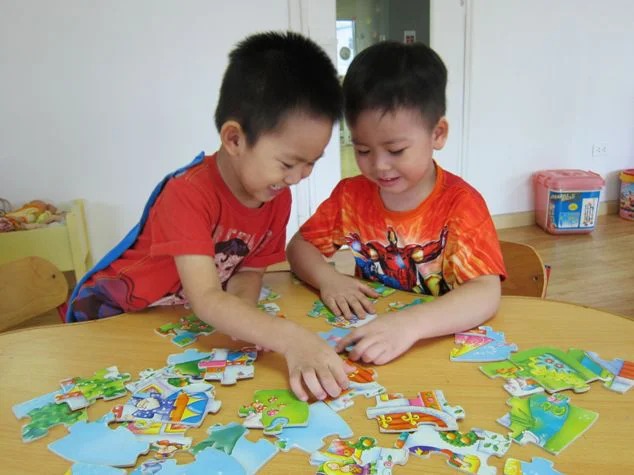
The Benefits of Baby Puzzles for Early Development
As a parent, you want the best for your child’s development. You aim to provide the right toys to help them learn and grow. One of the highly recommended toys parents should have on their list is baby puzzles. Baby puzzles come in different shapes, colors, and sizes, engaging babies and young children to connect, build, and differentiate among other parts of an image. In this blog, we’ll dive into the benefits that baby puzzles can give your child regarding their early development.
Boosts Cognitive Skills
One of the beneficial effects of baby puzzles is that they help develop cognitive skills. For instance, when your child fits the puzzle together, they enhance their shape recognition skills. They also improve their ability to match and sort things by size, shape, and color. Aside from that, baby puzzles require problem-solving skills, which your child will develop as they play and make up for a challenge.
Enhances Fine Motor Skills
Another benefit of baby puzzles is that they boost and improve your child’s fine motor skills. Fine motor skills involve:
- The development of small muscles in fingers and hands.
- Allowing them to do intricate movements, such as grasping.
- Pinching small objects.
Playing with baby puzzles can help improve these skills by grasping, manipulating, and placing puzzle pieces where they belong.
Provides Sensory Stimulation
Playing with baby puzzles provides sensory stimulation to help your child’s overall development. Baby puzzles come in different shapes, textures, colors, and designs, providing different sensory experiences that can stimulate your child’s brain. The different sensory experiences they get further develop their sensory processing and integration capabilities, which would benefit them in later years.
Fosters Social and Emotional Skills
Lastly, playing with baby puzzles also helps foster social and emotional skills:
- Playing puzzles with your child builds strong relationships as you work together.
- Puzzles can help relieve stress and calm down, making them a great tool for managing negative emotions.
- Puzzles can help boost self-esteem, such as when your child finishes a puzzle and feels proud of their accomplishment.
What To Keep In Mind
When choosing baby puzzles, it is important to remember certain things:
- Look for age-appropriate puzzles. Puzzles come in different shapes and sizes with various difficulty levels, so make sure the ones you choose match your child’s age and cognitive abilities.
- Check if the puzzle has any loose or sharp edges, as these could be a safety hazard for your child.
- Ensure the puzzle’s material is safe and non-toxic.
- Try to choose puzzles with simple designs or pieces that present more of a challenge as your child gets older.
Frequently Asked Questions
Q: How can I ensure my baby’s safety when they are playing with a puzzle?
A: Check if the puzzle has any loose or sharp edges, as these could be a safety hazard for your child. Additionally, ensure the puzzle’s material is safe and non-toxic. Finally, supervise your child at all times while they are playing with the puzzle. You can find the best imaginative play toys here at EducationAll.
Q: What other types of activities can help my baby’s development?
A: Other beneficial activities for your child’s development include reading books together, playing music, and engaging in art activities like coloring and painting. These activities promote language and cognitive skills as well as social-emotional growth. Additionally, outdoor activities such as walks in the park or visits to a playground can help your child develop motor skills and interact with the environment.
Q: What are the best materials to create homemade puzzles for my baby?
A: The best materials for homemade puzzles are non-toxic and safe for babies. Cardboard, foam boards, wood, felt, and fabric are common materials for baby puzzles. If you’re using paint or glue, ensure they are labeled non-toxic and safe for kids. Additionally, make sure the pieces are large enough so your baby won’t be able to choke on them.
Q: What tips can I use to encourage my baby to play with puzzles?
A: Start by helping your child understand how different shapes fit together; this will help build early problem-solving skills. Provide verbal encouragement while they play and avoid any frustration by gradually increasing the puzzle’s difficulty level over time. You can also reward them with stickers or other rewards when finished. Additionally, if your baby is having difficulty completing a puzzle, take some time to sit with them and help guide them through it. This will help build their self-confidence and give them the support they need to succeed. Finally, keep the playtime fun and encouraging – this will help motivate your baby to continue playing with puzzles.
Conclusion:
In conclusion, baby puzzles have various benefits that can help early development. They boost cognitive skills, enhance fine motor skills, provide sensory stimulation, and foster social and emotional skills. Incorporating baby puzzles as part of your child’s toy collection can be a great investment for long-term growth and development. With baby puzzles’ cognitive and physical benefits, parents can encourage an early love of learning while still having fun.







